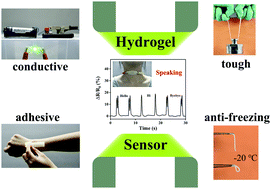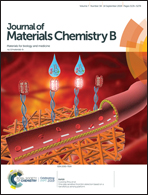Wearable strain sensors based on casein-driven tough, adhesive and anti-freezing hydrogels for monitoring human-motion†
Abstract
Flexible hydrogel-based sensors have attracted significant attention due to promising applications of wearable devices. However, fabricating a flexible hydrogel combining toughness, stickiness, anti-freezing capability and conductivity is still a great challenge. Here, casein and LiCl are successfully introduced into a polyacrylamide hydrogel to prepare a tough and adhesive PAAm/casein hydrogel, which exhibits good mechanical properties and excellent reversible adhesive behavior for diverse materials and human skin. Due to the presence of conductive ions, the PAAm/casein hydrogel exhibits high conductivity (0.0753 S cm−1) and anti-freezing properties (−21 °C). Moreover, the PAAm/casein hydrogel as a flexible wearable strain sensor is sensitive to both large-scale human motions (e.g., joint bending) and tiny physiological signals (e.g., speaking). It is envisioned that the strategy would provide novel inspiration for the development of flexible wearable protein-driven hydrogel devices.



 Please wait while we load your content...
Please wait while we load your content...